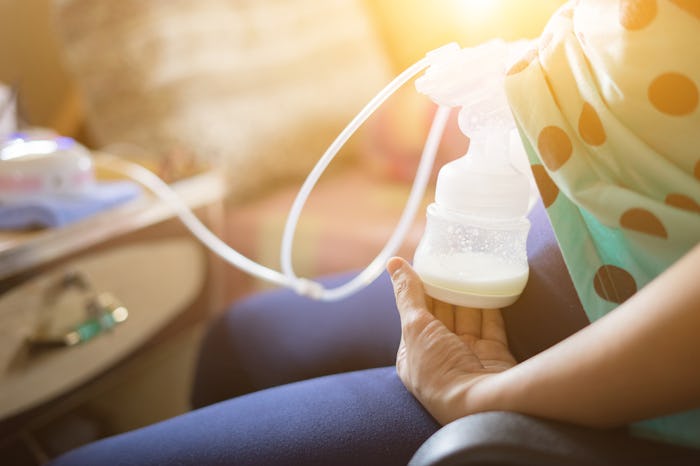Life

Can Pumping Trigger Depression?
In the breastfeeding world, the emphasis is usually on the benefits of breast milk, the sense of accomplishment, and the loving bonds created with your baby. For many women, these sensibilities ring true, but there's also some women who feel quite the opposite, especially if they're pumping all of the time — they may feel sad, down, or have negative emotions surrounding pumping. But can pumping trigger depression?
It's easy to see why pumping moms may feel down — the hassle of the pumps and bottles, the exhaustion pumping brings, its inconvenience in day-to-day activities, and the lack of bonding with their baby can be too much. The stress of pumping and storing everyday can get overwhelming, and can cause some frustration, too. I found that when I looked at pictures of my baby, pumping was a lot easier, and the thought of my my baby would calm me. But for some moms, it's still not enough. Pumping is stressful — bottom line.
But there are also some hormonal factors that can lead to sadness with milk release. According to D-MER.org, feelings of sadness or negativity right before milk is released is known as Dysphoric Milk Ejection Reflex (D-MER), which is not something many breastfeeding moms may expect. Since D-MER is brought on when milk is released, it can cause these negative emotions with either breastfeeding or pumping.
The D-MER website explained that, luckily, D-MER is not a part of depression, nor is it a psychological reaction or aversion to breastfeeding. It occurs when dopamine, a hormone in the brain that regulates happiness or your mood, naturally drops when you start feeding, in order for your prolactin, the milk production hormone, to rise. Usually the drop in dopamine is small, and quickly returns to normal, but in moms with D-MER, the drop is greater and lasts a bit longer. It is in this very fast and instant drop in dopamine that moms with D-MER feel those negative emotions, and as dopamine levels are stabilized, the negative feelings go away.
The D-MER website also explained that the intensity of D-MER can vary and determine how long the sadness lasts. There are also a range of treatments for moms with D-MER, which include prescription medications, natural treatments, and lifestyle changes.
So while some moms may feel a certain amount of sadness when they pump, it is good to know that pumping is not triggering depression, and that any feelings of sadness or negativity should subside when their hormones re-stabilize. It's always a good idea to reach out to lactation support groups or consultants if you're feeling down about breastfeeding or pumping. With love, support, and treatment, breastfeeding and pumping can be a part of your day that doesn't cause emotional discomfort.